Free Original Storyworld Ideas! Part 1: Spheres
Since I wrote two blog posts listing ten storyworld (or should that be “story world”?) ideas each, rating them for originality and singing the praises of the power of original story worlds, I’m launching a series of posts in which I will give away some of my personal ideas on story worlds that I think may be interesting to some readers here. Or at least I hope so. Starting with a storyworld I’m calling “Spheres.” Free of charge! 🙂
This particular idea I previously wrote about on my personal blog six years ago and haven’t done a thing with in my own writing. This post adapts what I wrote then to Speculative Faith and also includes a link to my podcast, in which I talk about this story idea in different words than I use here. This storyworld does have some original magic to be sure (original as far as I know) but doesn’t include the kind of social commentary that catches people’s imagination like 1984 or Gattaca.
The kernel of the idea for Spheres came from Francis Godwin’s 1638 book, The Man in the Moone, in which a Spaniard flies to the moon in chariot drawn by geese. Of course geese can’t fly to the moon because there isn’t air for them to breathe along the way. And even if there was air between the Earth and the moon, the distance is so far–roughly far enough to equal going all the way around the planet Earth in a circle ten times–the geese would never have the energy to make it all the way. (Of course Godwin was not writing with the lack of atmosphere or true distance in mind.)
“But what if,” my mind was wondering, “What if there was a fantasy world in which you really could fly a goose-drawn chariot to another planet? What would that story world be like?”
I immediately seized on the notion that gravity would have to be different. You can’t bring large astronomical bodies like the Earth and the moon too close together because gravitationally-caused tidal forces would rip the smaller body apart and do a great deal of damage to the larger. So I decided to change gravity so large astronomical bodies could be closer. I messed around with the equation for gravity in several ways to see if it could be strong enough at a short distance to allow things to seem more or less normal, but still allow major astronomical bodies to do things gravity as we know it does not allow.
I’m not a mathematician, but I wrangled with the problem for a while and did not really find any solution that provided exactly what I was looking for. So I decided that gravity would have to be artificial in such a fantasy world, that is, deliberately altered on a case-by-case basis to make such an environment possible. And following that thought inspired the rest of this story idea.
Spheres (I fondly imagine I will write stories in this story universe, but that hasn’t happened, so I’m offering up this idea to whomever would like to make use of it) will feature a world that is Earthlike in most respects, orbiting a sun like ours. But nearby this planet will be a number of other planets, at least a dozen or so, all no greater than 50,000 miles or so apart, bodies from much smaller than the home world to significantly larger. All of these will be enveloped in an massive over-atmosphere of oxygen that all the worlds swim in, allowing travel between them by extremely hardy flying birds (most birds couldn’t make the distance) and would allow special sailing ships between the worlds to chart the distance between the planets from the winds that flow between them.
Perhaps ballon-like creatures could collect helium or generate hydrogen or heat air inside them to float between the worlds. Perhaps a chariot could hitch itself to a group of such creatures. Or maybe even birds, to allow someone to literally fly from one world to the next.
This would be possible because the force of gravity would be under the control of powerful wizards, who with effort, manipulate it at will. So the massive over-atmosphere would not slow down orbiting planets so they crash (wizards make adjustments to prevent that) and they also would be responsible to reduce the force of gravity between planets to keep them from rendering each other asunder.
In ancient Greek thought, everything was composed of the four elements of earth, water, fire, and air. My mind in a flash realized modern science has identified four forces of nature: gravity, electromagnetism, and the strong and weak nuclear forces. Wouldn’t it be interesting if the practitioners of “gravity magic” never though of it that way? Instead they would think of themselves as being in control of “earth” and their type of magic (gravity control) as being “earth magic.” Likeise, wizards that control electromagnetism would see themselves as being in control of “air magic” (because light and lightning flashes and even magnetism are easy enough to associate with air). Those who have the power to dissolve the strong bonds of atomic nuclei or manipulate those bonds in other ways would see themselves as practitioners of “fire magic,” from something very much like inner fire that really is at the center of all matter. The weak nuclear force, responsible for radioactivity, does not relate to water very well in truth (except for the ability to make water glow blue), but nonetheless, imagine those who manipulate radioactivity with magical powers thinking of themselves as performing “water magic.”
So the story world of Spheres would be dominated by powerful schools of wizards at odds with each other (perhaps), but all of their magic would be based on manipulation of the four known scientific forces, with the consequences of such manipulations occurring as modern science would understand, though described in radically different terms in the thought of the storyworld itself. Of course not everyone in the story world would be a user of magic at all, not even close, so the key feature of this fictional universe would not be the magic per se but rather the many worlds having a great deal of contact with one another, in an entirely different way from any other fantasy story I’m familiar with.
If you like this story world idea or it inspires other thoughts you might have about creating a storyworld, let me know in a comment below. (Have you ever imagined combining real science with fictional magic? If so, how?)
By the way, you can catch my podcast on this subject via the link below:
https://travissbigidea.podbean.com/e/free-original-storyworld-ideas-part-1-spheres/


































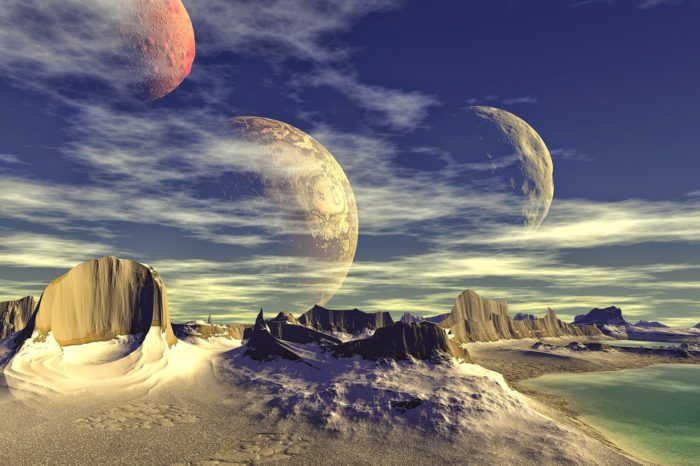

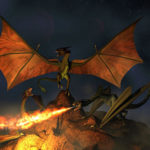
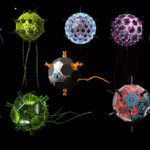
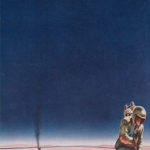
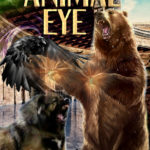




Sounds interesting 🙂 It vaguely reminds me of Disney’s movie Treasure Planet. It takes the plot of Treasure Island and puts it in a scifi/fantasy world where people can sail between planets in large boats. I don’t think it really talked about magic much, if at all. But it’s a good movie. The story world feels a little magical in its own way, and it’s really cool to see how the technology and world building is.
Donita K Paul’s Dragonkeeper Chronicles is very different from your idea, but she’s a Christian fiction author that kinda combines science with magic. In some ways that’s been a little more of a trend lately. Even if a magic system doesn’t follow science exactly, they still use it in an academic/scientific research kind of way. Fate Zero’s story world does that quite a bit. Waver, for instance, finds Caster’s hideout by taking magic samples from various spots along a river and testing them for magical residue. And there’s many other indications of mages in that world researching and using magic similar to how we would science. Kiritsugu’s father accidentally unleashed a plague of ghoul/zombie/vampire things on their island after experimenting with immortality, for example.
I tend not to use actual magic in my stories(though some of my chars believe in it). But there are spirits in my stories that can manipulate their environment based on scientific principles.
I know of a bit of combination of magic and science im stories, but I think the trend is to make magic act like science in that it’s predictable and regular and subject to controlled study. As opposed to actually combining the two.
I personally haven’t ever heard of magic directly manipulating known forces like gravity and electromagnetism within the limitations of what those forces can do. Have you?
As for Treasure Planet, yeah the Spheres story world would making sailing ships in space happen for reasons other than just-because-we’re-copying-history. The sails would be radically different though and the ships would seem to have to be more like airships than sailing ships…to get enough lift…
Yeah, I wasn’t trying to say Treasure Planet was super close to your idea, just that a few elements reminded me of it, and some of the aesthetics could work for someone writing your idea at least.
Honestly, my long term memory is pretty cruddy, so whether or not I can remember reading certain story elements is pretty hit or miss. It doesn’t help that even if a magic system involves manipulating scientific things like the four scientific forces, the story might not harp on it much, or at the very least other story elements seem more important, which makes the scientific magic part harder to remember. Fate Zero might do a bit of what you’re talking about. Kiritsugu was, in small quantities, able to use magic for Time Alter battle moves(so maybe it could have to do with relativity or spacetime). Not entirely sure if Time Alter was just to speed/slow his own body or if it literally messed with time. It seemed more to control how fast he could move, but even then it could have a scientific component to it, because developing and using that magic could very well require an understanding of biology in order to manipulate it. But then it’s hard to say for sure because even with all the information in that show, there was so much explanation it didn’t have time for.
But regardless of whether or not a show actually talks about chars using magic to manipulate the scientific forces, there can still be the obvious assumption that that is how their powers work, and maybe they just don’t realize it. Like, if a wizard flies around or can make things levitate, maybe that’s because controlling gravity is part of his powers, whether or not he actually says so.
Now that I think about it, though, Fullmetal Alchemist actually combines magic and science. Or, you can think of alchemy in that story as being between magic and science. The Law Of Conservation Of Energy (and Equivalent Exchange) are a very big part of that story/plot/magic system. From what I understand there’s a lot of discussion of God and atheism in there too, though I don’t know entirely since I haven’t seen much of that show. Obviously, since it talks about alchemy, it isn’t realistic per say, but it at least tries to combine magic and science, and maybe plays around with/builds a world based on historical views of science.
Donita’s Dragonkeeper Chronicles seems to try and do what you’re talking about in terms of magic having to work within the confines of scientific laws and what elements and forces can actually do, though you may or may not think it does so well/accurately. I think Brandon Sanderson likes to employ science in his magic systems as well.
Then again, science is more about research processes, methods and whatnot. Like the scientific process of experimentation and testing and investigation. Gravity itself and the control of it will not be science, and although maybe wizards in a story world have to work within what those forces can actually do, they could presumably figure out how to do so through rudimentary trial and error methods and not science. So if mages in a story world subject their magical research to scientific research processes, technically the story is combining science and magic, even if they sometimes work outside of what gravity and such can do.
Control of gravity by wizards is not science, but using forces identified by science and treating them in a way consistent with science, even if the characters in the story are unaware of it, is what I’m proposing is an original twist. Sure, some people have done similar things. For example, Full Metal Alchemist seems to put magic ideas alongside science and treat both seriously (I’m actually familiar with this manga!) But that’s not quite what I proposed.
Besides, the magic of forces from real science was just one factor of what I was offering as unusual or uncommon…
Travis: I was reminded, reading your discussion with Autumn Grayson about magic/science, of Randall Garrett’s old SF stories of Lord Darcy. He goes around solving mysteries along with his ‘sidekick’, Brother Sean (think that’s the right name). Brother Sean is a Catholic monk and a qualified licensed practicing magician, specializing in criminal investigations. (!)
In this parallel universe, magic IS the science of the world, obeys natural magic laws, and the proper, legal use of magic is overseen by the Church. (There’s been no Reformation in this world!)
Most of it is in short story form and there are a couple of the collections available on Kindle (no idea about other formats) Public libraries with large SF collections might have copies. Alternatively, some libraries may be able to borrow copies on interlibrary loan from other systems. ILL policies and availability vary widely
The 3 volumes still in electronic “print” are: Lord Darcy Investigates; Murder and Magic; and Too Many Magicians. I first read them many years ago and was delighted to find that they’re still available.
[Hope I caught all the typos!]
Sounds interesting!
Cool setting, Travis, thanks for sharing. 🙂 I’ve often thought about writing in a science fiction world where liveable planetary bodies are closer together (So that you don’t have to have to have magic speed) but more along the lines of multiple habitable moons around a gas giant.
Back in the old days before probes visited the gas giants, some old sci fi imagined the Galilean moons of Jupiter were habitable (e.g. Stanley Weinbaum)…it’s definitely got potential!
lol, I kinda cheat, I have genies that create portals. ;P Oh, and there are a couple of worlds with stationary portals like in the Wood Between Worlds.
Well, it’s a cheat others have done, too!
This calls to mind a vaguely like this series about Celestial Isles by Mollie Reeder, a steam punk series where train tracks float in the air connecting the isles.
I wasn’t aware of that book. Sounds interesting!
(But what makes them float?)